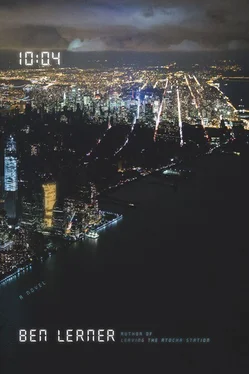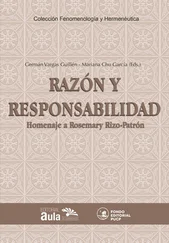I heard the norteño music, accordion and bajo sexto , before I saw the beams of the approaching truck. Instinctively, stupidly, I dropped to one knee on the gravelly soil so as not to be seen doing whatever it was that I was doing beside the dark building. A woman in the passenger side was singing along to the radio, maybe drunkenly, her window down: “Lo diera por ti, lo diera por ti, lo diera por ti.” When the truck passed, I stood up, brushed the dust off my pants, and walked back to the car. I drove across the railroad tracks and turned right onto a larger road; there was a gas station open. I stopped, bought a four-pack of butter, tortillas, eggs, and a large can of Bustelo espresso, and then drove silently back to the house on North Plateau. Right before I turned into the garage, my headlights reflected green off the eyes of a small animal, probably a neighbor’s cat or dog, but maybe a raccoon, if they had those in Marfa. The tapetum lucidum , the “bright tapestry” behind the eyes, bounces visible light back through the retina, making the pupils glow. I remembered the red-eye effect in the photographs of my youth, the camera recording the light of its own flash, the camera inscribing itself in the image it captured. Once inside the house I heated and ate several tortillas while I waited for the coffee to percolate in the rusty stovetop espresso machine, then took the pitch-black coffee to the desk in the studio, set up my computer, and began to write.
Thus, instead of beginning my residency by rising at 6:00 a.m. and walking several miles in the early morning dark, then working until lunch, walking again, then working again until dinner, at which point I’d take a third walk — I’d outlined this strict schedule to Alex, who had nodded politely, before I left New York — I went to sleep at sunup, having finished the tortillas as the first light filtered into the kitchen. It was 5:00 p.m. when I woke and, because I’d already woken in the bed once the previous day, it felt like the morning of my second full day, not the late afternoon of the first; I was already falling out of time. I walked into the bathroom and got out my razor and looked at myself in the mirror to find much of my face was covered in dark, dried blood; for a moment I was dizzy with fear and confusion, then realized I’d had a nosebleed. My first thought was of a brain tumor, but, after calming down and consulting Google, I realized it was no doubt altitude-induced; I’d had nosebleeds as a child when we vacationed in Colorado. I washed the blood off my face with a rag but couldn’t bear, after the shock, to draw a razor across my neck.
The sun was setting by the time I sat down at the desk to start my day. I had my lunch of scrambled eggs around 1:00 a.m. on the little porch, looking carefully for the first time at the house where Creeley began to die; I kept my porch light off. The house looked identical in layout to mine and it was occupied: the resident, Michael had told me on the way in from the airport, was a Polish translator and poet of whom I’d never heard. (There was a lunch planned for the next day so all the residents could meet one another if they wished, but I’d already sent an e-mail to Michael with my regrets, explaining that I was focused on work and keeping strange hours.) There was a light on somewhere in the house, probably the studio; the rest of the windows on the street were dark.
When I was about to go back in, having stood and opened the screen door, I heard the creak and bang of the screen door on the porch across from mine, the noise setting off a chain reaction of barking dogs. I hesitated; having hesitated, and knowing I’d been seen, even in the dark, I felt a pressure to turn around and signal some kind of greeting to the other nocturnal resident, who hadn’t put his porch light on. I did turn, plate and silverware in one hand, and saw the cupped flame as he lit his cigarette, thought I could make out a beard and glasses. I stood there awkwardly for a moment and then he raised his arm and I raised mine, feeling as I went back in, and feeling ridiculous for feeling it, that I’d just waved to Creeley.
The only book I’d brought with me to the residency, knowing that the house was full of books, was the Library of America edition of Whitman, its paper so thin you could use it to roll cigarettes. I’d brought that particular volume because I was teaching a course on Whitman next fall, assuming I wasn’t on medical leave, and hadn’t read him carefully in years — and hadn’t read much of his prose at all. Those first days of the residency, days that were nights, I would sit at my desk and read Specimen Days , his bizarre memoir, for hours. Part of what makes the book bizarre is that Whitman, because he wants to stand for everyone, because he wants to be less a historical person than a marker for democratic personhood, can’t really write a memoir full of a life’s particularities. If he were to reveal the specific genesis and texture of his personality, if he presented a picture of irreducible individuality, he would lose his ability to be “Walt Whitman, a cosmos”—his “I” would belong to an empirical person rather than constituting a pronoun in which the readers of the future could participate. As a result, while he recounts a few basic facts about his life, most of the book consists of him describing natural and national histories as if they were details of his intimate biography. And many of his memories are general enough to be anyone’s memory: how he took his ease under a flowering tree or whatever. (Whitman is always “loafing,” always taking his ease, as if leisure were a condition of poetic receptivity.) As a memoir, it’s an interesting failure. Just as in the poems, he has to be nobody in particular in order to be a democratic everyman, has to empty himself out so that his poetry can be a textual commons for the future into which he projects himself. And he is always projecting himself: “I am with you, you men and women of a generation, or ever so many generations hence; / I project myself — also I return — I am with you, and know how it is.”
The most riveting and disturbing and particular passages of Specimen Days are about the Civil War. What disturbed me as I read was what I perceived, rightly or wrongly, as the delight he took in the willingness of young men to die for the union whose epic bard he felt he was destined to be, and his almost sensual pleasure in the material richness of the surrounding carnage. Maybe I was projecting, but when Whitman walks the makeshift hospitals delivering to the wounded gifts of money that the rich have asked him to distribute, when he gives tobacco to those who haven’t suffered damage to the lungs or face, I thought he was in a kind of ecstasy. From the distance of my residency late in the empire of drones, his love for the young boys on both sides whose blood was to refresh the tree of liberty was hard to take. When I could no longer focus my eyes on the page, I would lie down on the hardwood floor and listen to recordings of Creeley, scores of which were available online; again and again, I played him reading “The Door” in the early sixties, static like rain on the recording, New York traffic sometimes audible in the background. And then I would listen at intervals to the one extant recording of Whitman, made by Edison: he recites four lines from “America,” a digital transfer from wax cylinder.
Days passed like this: turning in around sunrise, waking a couple of hours before sunset, my only contact with other humans the few words I exchanged with the attendant at the gas station where I continued to buy groceries, although there was an organic market in town, or with the elderly Mexican woman, Rita, whom Michael had recommended, who sold burritos out of her house. (I would drive to her house and buy a burrito soon after I woke, then reheat it for my midday meal at midnight; soon this meal was the only one I reliably took.) With the exception of one other wave on the porch when Creeley came out to smoke, I didn’t see the resident in the reflection of my house across the street, nor did I see anybody else. I had poor cell phone service and largely kept it off, exchanging some e-mails with Alex, none with Alena, and I talked to nobody from home. Before bed in the hour before sunrise I would walk the perimeter of the town, ranchland spreading out beyond it, hawks or maybe buzzards starting from the trees at the sound of my footfall on gravel. As the sun came up, I could see the white dirigible in the distance, a tethered aerostat surveillance blimp containing some kind of radar, searching for narcotraficantes passing over from northern Mexico, maybe also for immigrants, a strange helium-filled thing on the horizon that began to enter my dreams, as a version of it had long since entered Roberto’s.
Читать дальше










